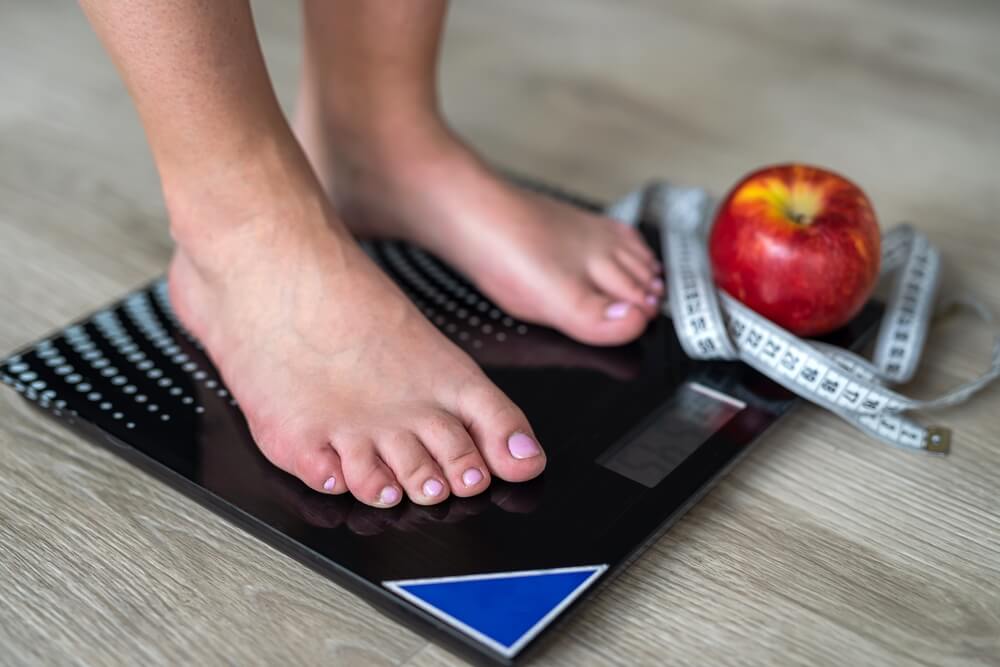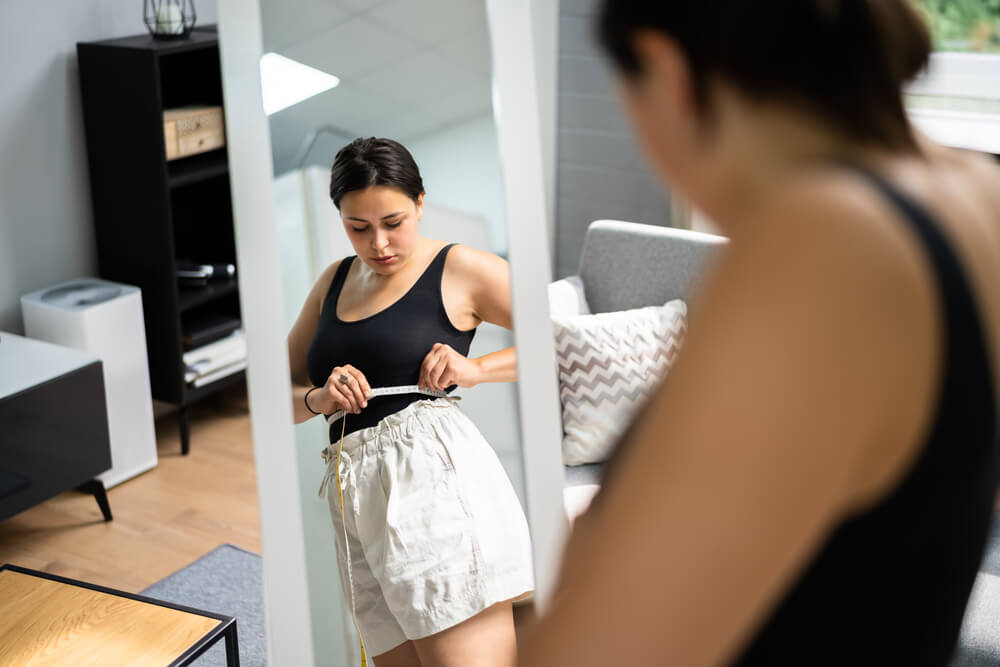What is Body Checking? Helping Adults and Teens Cope With It

We live in a world that is obsessed with physical appearance. Every day we are relentlessly exposed to images of models that are super attractive. Constantly seeing people that are so handsome and beautiful can begin to affect our self-image. It can also lead to obsessive body checking.
Contents:
- What is Body Checking?
- Body Checking in Teens
- Reasons for Body Checking
- Consequences
- How to Control Body Checking?
- Where to Seek Help?
What is Body Checking?

Albina Gavrilovic/Shutterstock.com
The definition of body checking is relatively straightforward. It refers to examining your body’s size, shape, and weight. It can also include focusing on specific physical features of your face, such as the size of your ears or nose.
Body-checking behavior can happen almost anywhere, anytime. We can check our appearance at home, on the way to work, in the office, or just sitting at home while watching TV.
Like most aspects of life, the degree of body checking is on a continuum. On one end of the scale, body checking can be quite harmless. A person might check their appearance occasionally. In moderation, most habits are not problematic.
For instance, most people will look at themselves in the mirror before setting off to work. That’s perfectly normal, and probably a good idea too. You never know when your collar is folded wrongly or if there is a drop of coffee on that white blouse.
However, on the other end of the continuum, it can escalate to something more serious. It starts out slowly, but then gradually becomes a near-continuous act. A person might check themselves in the mirror multiple times an hour or ruminate about how their body compares to others.
Specific Forms of Body Checking

RomanR/Shutterstock.com
Body-checking can take many forms. The most obvious is when walking past a large store window and taking a quick glance at yourself in the reflection. That is a quite common form of body-checking. In and of itself, that’s not much reason for concern.
Sometimes body checking might actually be a good thing. A few weeks back I took a quick glance as I walked by a large window display and discovered I was dragging along a candy bar wrapper someone had tossed on the sidewalk. Better a wrapper than something else.
Hopping on the scale to check your weight every now and then is another form of body checking. In this case, keeping tabs on your weight is a good thing. Especially with the portions restaurants serve, most of us need to count our calories; your cardiologist will thank you.
These are all examples of body checking that aren’t really an issue.
But, there can be other forms of body checking that elevate the matter. For example, frequently pinching and tugging at parts of your body. This is a strategy to determine if we are gaining weight.
Or, if you find yourself breaking out the tape measure several times a day to check on your waist or thighs, that might be something to worry about.
Some people will try to manipulate the shape of a part of their face by pulling or pushing it in a specific direction. They might get up from watching TV several times an hour and go to the bathroom mirror to stare at those protruding ears and try to push them back.
Believe it or not, when I was a teenager, I thought my ears stuck out too far. So, every night before going to bed I used scotch tape to pin my ears back. News flash: it didn’t help.
Then there are even more extreme manifestations of body checking that might raise red flags. Going through old photos and obsessing about how your body has changed over the years is taking one step further in the wrong direction.
Constantly trying to gain approval from others that your body is okay can be another sign that you are spending too much time obsessing about your body. This can get a little annoying to your friends and colleagues as well.
All kidding aside, these are signs that body checking is becoming obsessive. If body checking becomes a preoccupation that begins to disrupt your daily life, that’s a definite red flag.
Body Checking in Teens
Recent trends on TikTok have caught the attention of mental health professionals. There are several trends actually, and several are particularly worrisome. One trend involves young teen girls trying to encircle their waist with their hands. You can see an example of this trend here:
Waist obsession has gained a large following. The hashtag #smallwaist on TikTok has over 700 million views. That’s roughly 10% of the world’s total population. Other trends are growing by the day and racking up viewer numbers that are even more astonishing. For instance, the hashtag #sideprofile has over 1.2 billion views.
These videos perpetuate feelings of being inadequate in many young viewers. Teens are already at a highly sensitive age. These videos are creating a distorted body image that can be very damaging to their self-concept.
Browsing through the comments gives us more reason to take notice. Many viewers comment that they will not eat for the rest of the day. Others reveal feelings of shame and embarrassment because their body’s shape doesn’t match what they see in the video. Feeling this kind of shame is just not healthy. And just not right.
These videos and the sentiments expressed by young adults are very concerning to the mental health community. Given that teens can become especially obsessed with their physical appearance and gaining social approval, we all need to take notice.
Reasons for Body Checking

shisu_ka/Shutterstock.com
As stated in the beginning, we live in an appearance-obsessed culture. The media creates highly unrealistic standards of beauty that 99% of us can’t possibly meet. This sets the stage for body checking for a whole host of reasons.
Some people check themselves in the mirror because they are off to work or about to go on a date. No problem there. Your colleagues and romantic partner will probably appreciate the effort.
However, other people may engage in body checking because it is a symptom of an underlying issue. For instance, body checking is common among people that are struggling with body dysmorphia or an eating disorder such as anorexia.
according to Jillian Walsh, RD, RP(Q), body checking is sometimes a maladaptive coping mechanism. Checking one’s weight or shape is an attempt to reassure oneself.
As she explains, we bodycheck to “reassure the eating disorder brain.” It’s an attempt to reduce anxiety. Unfortunately, it creates a vicious cycle of self-reinforcement.
We check to reduce anxiety; the checking reduces anxiety; so, we are more likely to do it again. What starts out as minimal and infrequent, and relatively harmless, can easily escalate into an obsession.
To make matters worse, we have all had to spend more time indoors over the last few years due to the pandemic. Sitting all day for remote work or studying, is just flat-out unhealthy, physically and psychologically.
As if that wasn’t enough already, gyms have been closed and outdoor activity is far less likely. Over the last several years, most of us have been a lot more sedentary than usual. All that time indoors gave us a lot more time to gain weight and obsess over everything, including our bodies.
When we start to add up all of these factors, it is a surefire recipe for trouble.
Consequences

Friends Stock/Shutterstock.com
What are the consequences? Well, the consequences can be quite severe. Although in most cases body checking is not a health risk, it can become one.
- If it becomes a compulsion to an extreme degree, then it can begin to dominate our thoughts and feelings. Dr. Lara Zibarras explains that it’s the distorted perceptions of our body, “along with continuous negative thoughts about our bodies, that take up a lot of mental capacity which negatively impacts our ability to concentrate or think clearly.”
- Instead of thinking about work or problem-solving the usual daily hassles in life, our minds are cluttered with this unhealthy preoccupation. It drains our psyche of energy. This can lead to making simple mistakes that may not be so consequential, but certainly frustrating. Occasionally, those mistakes might be more substantial.
- Another negative consequence is that we might attempt weight reduction strategies that are unhealthy. Not eating enough, or going on fad diets that have not been approved by registered professionals, can lead us down a very dangerous path.
- Unbalanced nutrition weakens the body. It wreaks all kinds of havoc on the immune system. During a pandemic, this can be especially dangerous. Even with proper vaccination, the body still needs to have a healthy and strong immune response to infection.
When it’s all said and done, the possible negative consequences of body checking should not be taken lightly. If our preoccupations begin to disrupt our work, or we start to practice unhealthy eating habits, then that’s when things have gotten out of hand.
How to Control Body Checking?

Andrey_Popov/Shutterstock.com
Fortunately, there are a range of effective strategies that can help us control body checking.
The Daily Journal
The first step is to determine how much body checking you are engaging. To do this, keep a tally for one full day.
Each time you look in the mirror or pinch some flab, or break out the tape measure, keep a tally. You can use a small sheet of paper or in your phone, whichever is most convenient.
This will give you a clear picture of how much body checking you are doing daily. Awareness of the issue is always the first step. This awareness will allow you to ask yourself some serious questions: How am I benefitting from this? What is the purpose of this behavior?
Asking yourself these questions can help you see how unhelpful body checking actually is to your life. It can also help you explore why you are body-checking so often and give you some insight into underlying motives.
Set a Limit for Social Media
Since social media plays such a significant role, try to limit your exposure. Put yourself on a schedule that prohibits spending time online during certain periods of the day.
For example, tell yourself that from 9-noon you will stay off social media completely. Once you have achieved that goal, then increase that time by adding another two or three hours.
This very short video shows how to easily set your phone’s screen time limit for every social media app:
If a teenager has this problem, they or their parents can be advised to use the Kids360 app. It will help to control the time spent online and restrict access to unwanted content.
Eliminate Opportunities
One way to control body checking is to eliminate the tools used to body check. So, put a blanket over any unnecessary mirrors you have in the house. During Zoom meetings, click on the option that hides your image on your screen.
Change your route to work if you have a tendency to check your image in certain store windows or when you pass by parked cars. Car windows can be just reflective enough to allow a quick glance.
And throw away that tape measure. Do you really need it anyway? Are you working as a tailor?
Unfollow Triggering Social Media Accounts
There is no good reason to follow people that post videos of themselves encircling their waist with their hands. Unfollow influencers whose main purpose in life is to show how beautiful they are. Likewise, unfollow hashtags that make you feel bad.
Remember, every time you click on a video that is about physical attractiveness or an eating disorder, there is an algorithm out there somewhere that is queuing up another 20 videos just like it. Those will line up in your feed, waiting to make your journey back to normalcy even more difficult.
Of course, you don’t need to try every one of these suggestions to get results. Choose one or two that sound right for you, and stick with it. It’s okay to start small and work your way up. The main thing is to get started and be determined.
Where to Seek Help?

SB Arts Media/Shutterstock.com
If you think you might benefit by speaking with a trained professional, there are many options. Contact with qualified experts can be done online or through a phone call.
There are many types of professionals that are qualified to offer assistance. For example, licensed counselors, psychologists, clinical social workers, and psychiatric nurses have all received advanced training in mental health-related issues.
They do differ in their approach. Some take a behavioral approach, which means they will focus on changing your behaviors and spend less time delving into deep-rooted psychological dynamics. Others will be more focused on exploring aspects of your environment, family and personal matters.
The key to success is to find a qualified professional that you feel comfortable with. If that means visiting several people to see which one feels right, then that is perfectly okay. In fact, it is recommended. It’s best to work with someone that you feel right about. So, take your time until you find the best option that works best for you.
Body Сhecking is OK Within Reasonable Limits

Wpadington/Shutterstock.com
Body checking is a part of everyday normal behavior until it’s not. If it begins to disrupt your ability to concentrate and get work done, or if you measure your thighs three times an hour, then it’s time to think twice.
Fortunately, there are several things you can do to limit your body-checking behavior. Limiting social media activity and eliminating opportunities to bodycheck are good places to start.
If you feel like talking to an expert is the right way to go, then contacting a qualified professional is very convenient.
Remember, it’s okay to be who you are. We are each born with a special shape that is unique to us and makes each one of us a part of a very large puzzle called “human beings.” If we were all the same shape, that puzzle would be no fun at all.
Little Task for You
Take a look at the two scenarios below and choose one to comment on.
- Your friend and colleague frequently looks at himself in the reflection of his phone… during meetings. Usually, it’s just a quick glance, but occasionally he turns his head from side to side or even adjusts his hair. So, what should you do? Should you say anything at all? If you think saying something is a good idea, then tell us exactly what you would say. Be specific. Write the very first sentence you would say to your colleague.
- Were you once an obsessed body checker? What kind of body checking did you engage the most? How did you turn things around? Tell us about the strategies you used to help yourself stop.
The picture on the front page: Twinsterphoto/Shutterstock.com
Проверьте электронный ящик



















